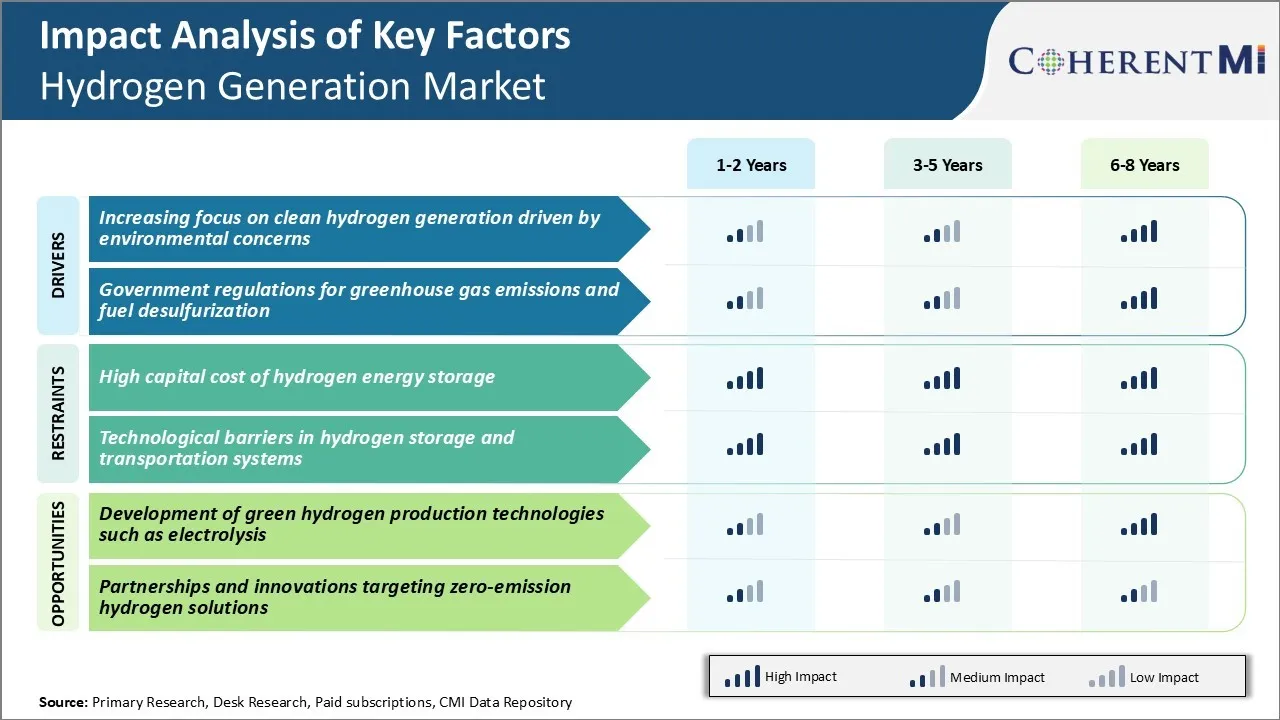Hydrogen Generation Market Trends
Market Driver - Increasing Focus on Clean Hydrogen Generation Driven by Environmental Concerns
The hydrogen generation market is witnessing increasing focus towards cleaner production methods of hydrogen driven by growing environmental concerns worldwide. Hydrogen has potential to act as an important fuel for realizing a low carbon future if it is generated through renewable resources.
There is rise in demand from end use industries like oil refineries, chemical and fertilizer producers which are major consumers of hydrogen, for obtaining supplies from cleaner production routes. This is propelling related companies to invest in innovative electrolysis technologies that use renewable electricity to split water into hydrogen and oxygen.
Even automobile sector is showing willingness to adopt hydrogen fuel cell vehicles provided the fuel is generated sustainably without carbon footprint. This requires scaling up renewable hydrogen economy. Investments are pouring in research aimed at reducing costs of electrolysis and renewable hydrogen technologies. Manufacturers in the hydrogen generation market are aiming to compete effectively with traditional means of production. Concerted efforts are ongoing globally to accelerate commercialization of clean hydrogen.
Market Driver - Government Regulations for Greenhouse Gas Emissions and Fuel Desulfurization
Stringent regulations introduced by various governments worldwide to curb greenhouse gas emissions. They also aim at reducing sulfur content in transportation fuels are functioning as a key driver for hydrogen generation market. Many nations have implemented policies and imposed limits on industrial facilities as well as transportation sector regarding permissible levels of polluting emissions.
Growing sulfur regulations especially in developed markets are also augmenting hydrogen demand from oil refineries significantly. Even maritime sector regulations are pushing adoption of low sulfur bunker fuels which again needs large scale hydrogen consumption at refineries for deep desulfurization of heavy fuel oils.
Implementation of stricter emission performance standards for factories, power plants, and other fixed installations have led to far greater use of carbon capture, utilization, and storage technologies. Rising compliance with emission norms is propelling process industries to make modifications and retrofits at their plants which are fueling hydrogen consumption. Such policy driven factors are significantly contributing to growth of global hydrogen generation market.

Market Challenge - High Capital Cost of Hydrogen Energy Storage
One of the major challenges faced by the hydrogen generation market is the high capital cost associated with hydrogen energy storage. Storing hydrogen requires either compressed hydrogen gas tanks or cryogenically cooled liquid hydrogen storage tanks, both of which require expensive equipment and infrastructure.
Compressed gas storage tanks need to withstand extremely high pressure of up to 700 bars, making them costly to manufacture. Liquid hydrogen storage also requires cooling hydrogen down to -253°C, which is an energy intensive process.
Further, hydrogen has a very low energy density by volume as compared to fossil fuels, requiring large storage spaces. The high initial capital investments required for production, storage, transportation and dispensing of hydrogen is a drag on the growth of the hydrogen economy.
While costs may reduce with expected technological improvements and economies of scale in production, high capital costs continue to be a major roadblock for widespread commercialization of hydrogen technologies currently.
Market Opportunity - Development of Green Hydrogen Production Technologies such as Electrolysis
One significant opportunity for the hydrogen generation market lies in the development of green hydrogen production technologies such as electrolysis. Electrolysis involves using renewable electricity to split water into hydrogen and oxygen gas, thus providing a clean method of producing hydrogen without greenhouse gas emissions.
Considerable research is ongoing to improve the efficiency and lower the costs of electrolysis technologies. Advancements in areas such as improved catalysts, membrane materials and system design offer potential to bring down the costs to commercially competitive levels compared to fossil fuel-based hydrogen generation. Growing focus on developing renewable energy capacities also provides ample low-cost electricity input for electrolysis plants.
Increased investments in electrolysis and other green hydrogen production methods could help address sustainability objectives and accelerate the energy transition while creating growth prospects for the hydrogen generation market. This presents a major opportunity for vendors to establish themselves in this emerging clean technology space.